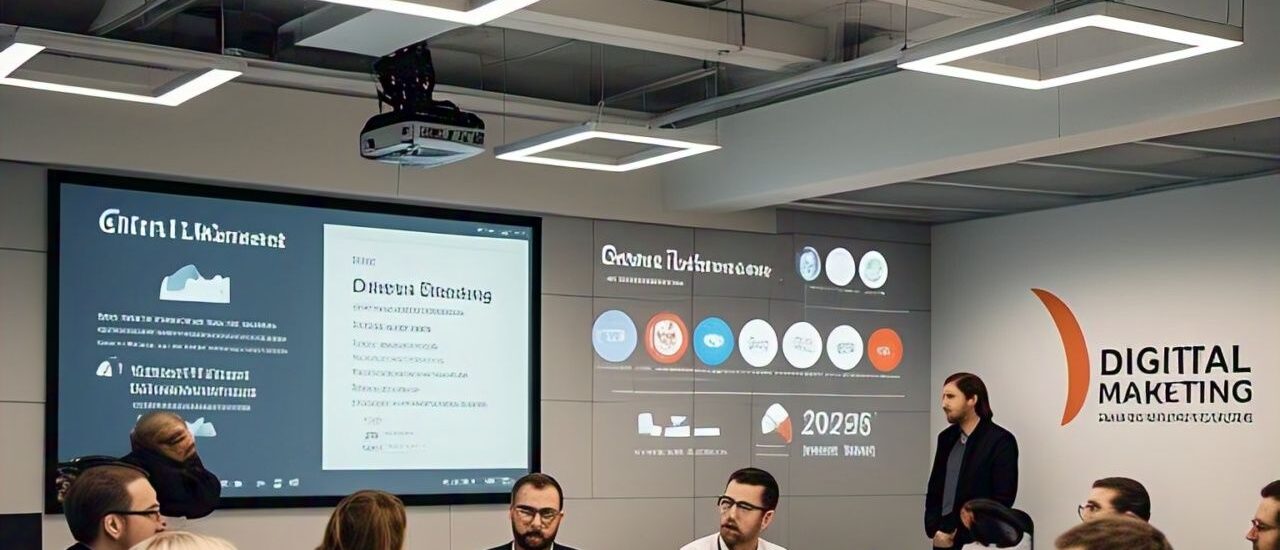Top Digital Marketing Trends in 2025: Stay Ahead of the Curve
As we move further into the digital age, marketing strategies are continuously evolving. To maintain a competitive edge, businesses need to stay updated on the latest trends and technologies that shape the digital marketing landscape. In 2025, new trends in digital marketing are expected to dominate, and understanding these shifts will be crucial for businesses looking to engage with consumers and achieve growth. From AI-powered solutions to immersive experiences, here are the top digital marketing trends that will shape the industry in 2025.
Main points
Toggle1. AI-Powered Marketing: The Rise of Automation and Personalization
Artificial Intelligence (AI) is set to revolutionize digital marketing by enhancing automation and personalization efforts. In 2025, businesses will leverage AI to create more tailored and personalized experiences for their audience. This includes AI-driven content recommendations, predictive analytics, and advanced chatbots capable of understanding customer needs at a deeper level.
AI tools such as machine learning will help marketers anticipate customer behavior and provide real-time, personalized experiences. Automated processes will not only save time but also drive higher engagement rates and customer satisfaction. As a result, brands that use AI to craft personalized journeys will have a significant advantage in customer retention and acquisition.
2. Voice Search Optimization
With the growing adoption of voice-activated devices like smart speakers, voice search is becoming a key player in how consumers interact with the internet. By 2025, it’s predicted that voice search will account for a large portion of online queries. For businesses, this means that optimizing content for voice search is more important than ever.
Voice search optimization focuses on conversational keywords and providing concise, informative answers. Marketers need to ensure their websites and content are optimized for voice search queries to remain discoverable by users utilizing virtual assistants such as Alexa, Google Assistant, and Siri. This shift will require marketers to adjust their SEO strategies, focusing on natural language processing (NLP) and long-tail keywords.
3. Interactive and Immersive Experiences: AR & VR
Augmented Reality (AR) and Virtual Reality (VR) are no longer just futuristic technologies; they are becoming essential components of digital marketing strategies. By 2025, brands will use AR and VR to create immersive shopping experiences, virtual showrooms, and interactive advertisements that engage consumers in ways that traditional media can’t.
For example, brands can allow customers to try products virtually, like testing how furniture fits into a room or how a makeup product looks on their face using AR. VR, on the other hand, can be used for fully immersive brand experiences, allowing customers to “experience” a product or service before making a purchase. These technologies provide a deeper emotional connection and increased engagement with customers.
4. Social Commerce: Shopping Directly on Social Platforms
Social media has evolved into a powerful e-commerce channel, and by 2025, social commerce will play an even more prominent role. Social platforms like Instagram, Facebook, and TikTok have already begun integrating shopping features, allowing users to browse and buy products without ever leaving the platform.
In 2025, we can expect to see further growth in social commerce, with even more platforms incorporating integrated shopping experiences. This shift will allow businesses to reach customers in a more seamless and convenient way, leading to higher conversion rates and improved customer engagement. For brands, leveraging social commerce will be crucial for driving sales directly from social platforms.
5. Video Marketing: Short-Form and Live Streaming Dominance
Video marketing has proven to be one of the most effective ways to engage audiences, and in 2025, its dominance is expected to grow even further. With the rise of platforms like TikTok and Instagram Reels, short-form videos are taking center stage. These bite-sized pieces of content are perfect for capturing attention in a fast-paced world.
In addition to short-form content, live streaming will continue to gain popularity as a means to interact with customers in real-time. Live video allows businesses to engage with their audience more directly and authentically, whether it’s for product launches, Q&A sessions, or behind-the-scenes glimpses. By 2025, we can expect more brands to invest in live streaming to create meaningful, real-time connections with their customers.
6. Data Privacy and Ethical Marketing
As concerns over data privacy continue to rise, businesses must adopt ethical marketing practices to maintain consumer trust. In 2025, stricter data protection regulations and privacy laws are expected to come into play, meaning marketers will need to be transparent about how they collect, store, and use customer data.
Consumers are increasingly looking for brands that prioritize ethical practices and respect their privacy. As a result, businesses will need to adopt privacy-first marketing strategies, ensuring they are compliant with new regulations while also offering customers greater control over their data. Building trust will be a key factor in creating lasting relationships with consumers in the future.
7. Influencer Marketing 2.0: Micro and Nano Influencers
Influencer marketing has been a dominant force in digital marketing, but by 2025, the focus will shift towards micro and nano influencers—individuals with smaller but highly engaged audiences. These influencers tend to have more authentic relationships with their followers, making them more effective in driving conversion.
Brands will focus on building partnerships with influencers who resonate with their target audience, even if they have fewer followers. This shift will allow companies to create more personalized and relatable campaigns that feel less commercialized and more authentic. The rise of micro and nano influencers will make influencer marketing more accessible and cost-effective for brands of all sizes.
8. Sustainability and Purpose-Driven Marketing
In 2025, consumers are expected to be even more conscious of the environmental and social impact of the brands they support. Sustainability and purpose-driven marketing will become a key focus, as consumers demand transparency and accountability from businesses.
Brands that emphasize sustainability, ethical sourcing, and social responsibility will stand out to a growing base of eco-conscious consumers. Purpose-driven campaigns that align with the values and passions of the target audience will foster stronger connections and brand loyalty, leading to long-term success in the marketplace.


Вопрос xrumer прогон https://www.olx.ua/d/uk/obyavlenie/progon-hrumerom-dr-50-po-ahrefs-uvelichu-reyting-domena-IDXnHrG.html интересует многих SEO-специалистов, так как этот метод ускоряет продвижение.